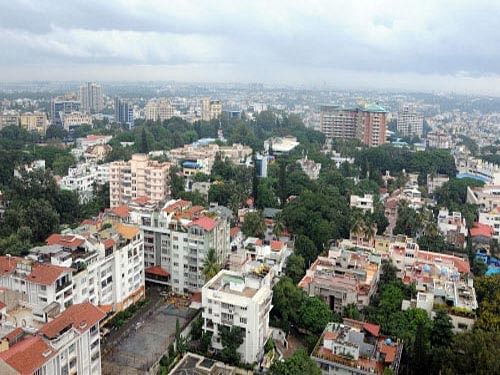Last Updated IST

A couple of ministers from Bengaluru have also backed the views expressed by planners and feel that time has come to move from planning in isolation to an integrated and interdisciplinary approach. DH file photo
As the Bangalore Development Authority (BDA) gives final touches to the Bengaluru Master Plan-2031 (BMP-2031), there is a growing demand by urban planners that the State government reconsider it and adopt a more dynamic strategic and spatial plan for the City to further avoid unbridled and unplanned growth.
A couple of ministers from Bengaluru have also backed the views expressed by planners and feel that time has come to move from planning in isolation to an integrated and interdisciplinary approach.
Cities across the world have shifted to strategic and spatial planning while the BDA is stuck with the outdated legislation of Town and Country Planning Act with primary focus on demarcating land use pattern with regulatory powers. Though the plan is prepared by the BDA by seeking inputs from other civic agencies, the master plan is not binding on them as each agency will have their own plans.
On the other hand, strategic and spatial planning, experts say, actively involves all agencies to prepare a detailed sectoral plan to ensure ‘One City–One vision’.
‘Kiss of death’
“If the government approves the BMP-2031, it will be a kiss of death for Bengaluru,” says urban planner V Ravichandar. He urged the government to reconsider its plans to go ahead with the BMP-2031.
He, along with urban planner Rejeet Mathews of the Delhi-based World Resource Centre, recently made a presentation to Chief Minister Siddaramaiah and Bengaluru Development Minister K J George on strategic and spatial planning. George said that he was open to new ideas while the chief minister sounded positive, they said.
Mathews, who has done a study of urban planning in Bengaluru, Mumbai and the National Capital Region, Delhi, said that master plans didn’t address any of the issues that affect the city and citizens. “There is a disconnect between the people, issues and plans. An informal study on the rate of implementation of the previous master plan by the BDA hardly touched single digit,” she pointed.
Problems of Bengaluru are not unique, says Minister of State for Agriculture Krishna Byre Gowda.
“Cities all over world have gone through this phase. We can look at how they have solved these problems and learn from them,” he said, stressing the need for ‘sectoral strategic planning’.
“We are struck in a time warp where we are not moving ahead with the needs of the time. That’s why we have so many problems. There is a general thinking within the government and even among Congress leaders in Delhi that something needs to be done for Bengaluru to avoid far-reaching ramifications,’’ he says.
Minister of State for Food and Civil Supplies Dinesh Gundu Rao, too, opined that the “need of the hour is to prepare an integrated plan by involving all civic stakeholders and experts.”
A couple of ministers from Bengaluru have also backed the views expressed by planners and feel that time has come to move from planning in isolation to an integrated and interdisciplinary approach.
Cities across the world have shifted to strategic and spatial planning while the BDA is stuck with the outdated legislation of Town and Country Planning Act with primary focus on demarcating land use pattern with regulatory powers. Though the plan is prepared by the BDA by seeking inputs from other civic agencies, the master plan is not binding on them as each agency will have their own plans.
On the other hand, strategic and spatial planning, experts say, actively involves all agencies to prepare a detailed sectoral plan to ensure ‘One City–One vision’.
‘Kiss of death’
“If the government approves the BMP-2031, it will be a kiss of death for Bengaluru,” says urban planner V Ravichandar. He urged the government to reconsider its plans to go ahead with the BMP-2031.
He, along with urban planner Rejeet Mathews of the Delhi-based World Resource Centre, recently made a presentation to Chief Minister Siddaramaiah and Bengaluru Development Minister K J George on strategic and spatial planning. George said that he was open to new ideas while the chief minister sounded positive, they said.
Mathews, who has done a study of urban planning in Bengaluru, Mumbai and the National Capital Region, Delhi, said that master plans didn’t address any of the issues that affect the city and citizens. “There is a disconnect between the people, issues and plans. An informal study on the rate of implementation of the previous master plan by the BDA hardly touched single digit,” she pointed.
Problems of Bengaluru are not unique, says Minister of State for Agriculture Krishna Byre Gowda.
“Cities all over world have gone through this phase. We can look at how they have solved these problems and learn from them,” he said, stressing the need for ‘sectoral strategic planning’.
“We are struck in a time warp where we are not moving ahead with the needs of the time. That’s why we have so many problems. There is a general thinking within the government and even among Congress leaders in Delhi that something needs to be done for Bengaluru to avoid far-reaching ramifications,’’ he says.
Minister of State for Food and Civil Supplies Dinesh Gundu Rao, too, opined that the “need of the hour is to prepare an integrated plan by involving all civic stakeholders and experts.”
Deccan Herald is on WhatsApp Channels| Join now for Breaking News & Editor's Picks